By Alex Meylink
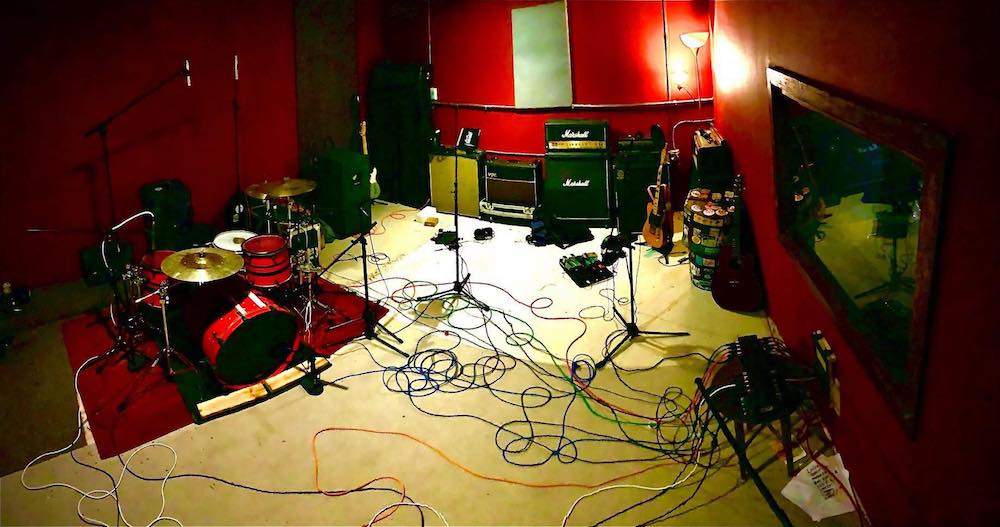
The other day, I got a message from a past client: “Can I hire you to teach me how to record?”
I was flattered. My ego puffed up. Maybe I was finally becoming Milwaukee’s own Steve Albini. Soon I’d be making YouTube tutorials for multinational audio companies. They’d name plugins after me. Someone wanted to know how I record?!
I pumped the brakes. Reality set in. I thought of my rudimentary understanding of electronics and how I could never seem to remember the names of those boutique condenser mics I couldn’t ever afford. I considered the very small number I listed this past year on my taxes under “business income”. I remembered how just the other day I used a Kurt Ballou mix as a reference track for one of mine and wanted to curl up in a ball and die. This devastating mental one-eighty happened in a matter of seconds.
That’s the crushing beauty of recording music. You’re never done learning. You’re never as good as you can be. You can fake your way through a lot of creative endeavors. You cannot do so in recording. Your work will sound like unlistenable shit through your first few attempts. Worse, it’ll start sounding like unlistenable shit you actually spent time on. You won’t make a dime, or at least you won’t get out of the red for what might seem like an unbearable amount of time. But it’ll push you to improve, and slowly you’ll pick up the tools and gear you need along the way. All of a sudden, you’ll play back a final mix and be pleasantly surprised…or even stoked.
At some point early in my recording path, the audio world consumed me. Recording music became the only thing that stoked the fire in the smoldering ashes of my cold, dead heart. It was all I wanted to do. I would accept anything north of minimum wage if it meant I could record music in my own studio all day.
Okay. I’m not quite there yet. I still hold down a bartending gig to pay the bills between some un-booked time and touring. But I worked my way from absolute zero to now running my own recording studio with a few pals and find myself happily spending days each week getting paid to do the best work on the planet.
Here’s a step-by-step guide on how I got to where I am today. In hindsight, most of the decisions I’ve made were what any studio tutorial would label “foolish”. For the most part, they definitely were. I’ll include a few handy takeaways from each step in the process. Learn from my mistakes and accidental successes and maybe you’ll be earning money part-time (or full time!) doing what you love much more quickly than I have:
1. Buy a bunch of gear you don’t know how to use
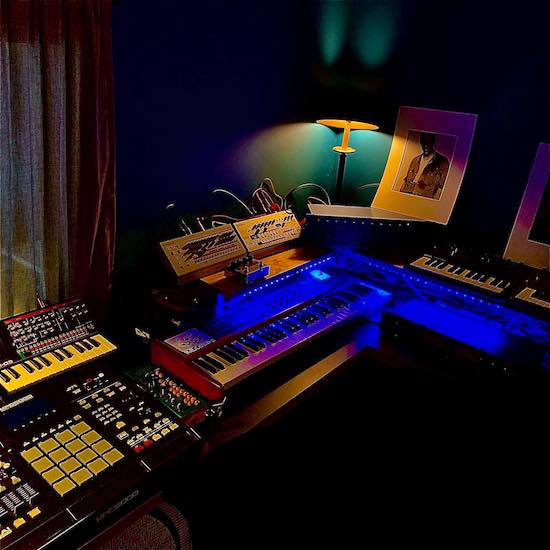
One of the most common pieces of advice you’ll hear about starting your own studio is to avoid putting yourself in any debt buying gear. Wise, certainly, but I’m glad my dumbass impulsive brain ignored this.
In 2016, I was on tour with my band and our van talk turned to recording. Specifically, how we wished we could just record ourselves. We were no strangers to bad studio experiences, and even the good ones usually came with the caveat of a steep bill. Why not put that money instead into a self-sustaining setup? We decided (after almost twenty whole minutes of discussion) to invest in a bulk of recording gear and begin recording ourselves and our friends. Our drummer Erik (my current studio partner) had the most recording experience and was to be our Sherpa. The next day, I opened financing cards for two major music websites and purchased about $5,000 worth of basic recording gear at Erik’s behest (I won’t go into too much detail here: Pro Tools, a consumer-level interface, the usual beginner mics. You know. The basics). The same day I financed a studio PC through Best Buy. Though we agreed to split the payments, on paper I was already $6,000 in the hole. But the gear started arriving and it felt like Christmas morning. We were ready to record music.
Key Takeaways: You don’t need to spend a fortune on your startup gear, but some of the basics are expensive. An interface with at least 8 preamps, an industry standard DAW, and a few versatile mics are key. If you can, invest with a trusted partner or two. You can share the financial weight and learn together, building off each other’s strengths.
2. Set up your gear in the bathroom
We decided my parents’ finished garage was the perfect space to house our new studio. My dad hesitatingly agreed, and soon we assembled our gear in the main room, with the interface and PC housed in, no joke, the bathroom. After a few months of recording demos out of this space, we recognized a 45-minute commute was not an enticing incentive to put in the work. A conveniently timed breakup between a roommate and his girlfriend left us some extra space in our own house. We moved the gear home and set up shop in our dining room, doing the bulk of our recording from this location over the following few years. We tracked every instrument and vocalist in our living room mere feet away. When we realized we needed more isolation between our supposed “live room” and the “control room”, we moved the gear up to my bedroom on the second floor. No setup was ever perfect, but it allowed us to explore our craft without spending any further money.
Key takeaways: You likely won’t start with a perfectly treated space. Learn to work within what you have. The closer it is to where you sleep, the easier it will be to spend the time you need to not suck. Mixing in a bedroom with weird and slanting walls taught me the importance of mix-checking on other speakers. Tracking drums in a living room forced us to hone our close mic-ing and our cable management.
3. Enroll in your local community college
As our band got busy tracking, I quickly realized recording wasn’t something I could just “figure out” through osmosis as Erik ran each session. I watched some YouTube videos and even downloaded (and never opened) the Pro Tools user guide, but I got exasperated with how little I was learning. I decided to enroll in the audio engineering program at a local tech school. A lot of industry pros would scoff at the idea, but the structure and guidance helped a university-educated dumbass like me gain the basic tools and knowledge I’d need much quicker than I could stumble across online. My teachers were knowledgeable, and we got some hands-on practice with a bunch of really great gear (I had the distinct advantage of enrolling in a technical college that had recently invested a huge chunk of money in their audio engineering department). Their stuff was pretty cutting edge. Look, I’m not gonna shill for Full Sail here. Going to school put me in further debt, and you could easily learn what I learned without spending a dime. However, I enjoyed my experience, and instead of burning hours reading a couple keyboard warriors battle over an outboard compressor on Gearslutz, I got the chance to set up and track a full band on a massive SSL console. Wild.
Takeaways: If the structure of learning recording in a school environment appeals to you, look into your local community or tech college. Avoid the big cost private schools that advertise everywhere. Here’s the key: only take the classes you need. No one cares about your audio engineering degree. I’ve never had a client ask to see one. I took enough classes to learn how to track and mix in Pro Tools and Logic, along with the basics of live sound reinforcement and studio management/ sound treatment, and that was enough for me.
4. Record your band (a lot)
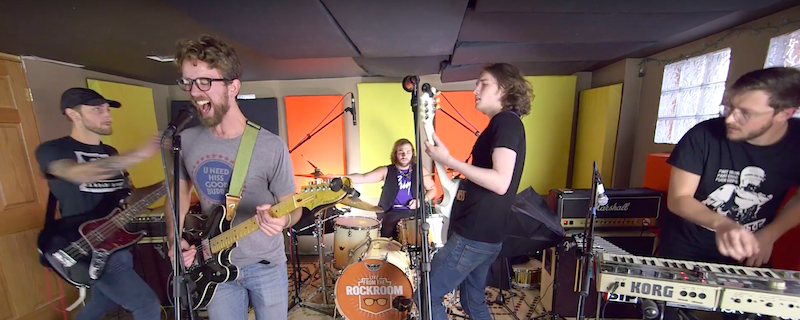
I dropped out of school. I had learned enough. Armed with a basic grasp of Pro Tools key commands, the EQ chart etched into my brain, and big visions of lush, crisp mixes, I knew I had what I needed to make a good record. Still, no band knocked at my door to track their next hit single.
Fair enough. My own band had a new song we needed to demo. I got to work. I spent hours getting my mics placed. Tracking everything just right. I put my new knowledge of frequencies and the function of compressors to work, slaving a full day on the final mix. I bounced it and…it sounded like garbage. I was crushed. But it increased my resolve. I used the following months to record more demos for my band, trying new things, seeking new ways to improve my mixes. They painfully, slowly got better and no paying customer had to suffer. If recording music is an artform, then these early demos were my childhood crayon drawings. The beauty is that they never had to be heard by anyone besides me or my band. By the time I had convinced some gullible friends to let me record them, I was able to create a product that was actually listenable.
Takeaways: Trying out new gear and plugins in my own band’s sessions and spending extra hours dicking around on our mixes is something I STILL do to avoid wasting anyone else’s time and money. Your bandmates or musical partners won’t pull any punches. They’ll let you know where you need to improve. The best part is that you’ve got the clearest vision for how you want your own songs to sound, so you’ll know what you’re working towards. You’ll end up your own pickiest client.
5. Record your friends for free, then for cheap
After several months of self-recording, I told my buddies in a local hardcore band that I could make a record that sounded at least as good as their previous release. They weren’t so sure. I offered to do it for free. I had no client base or even any prospective clients; I just wanted to build a resume. They agreed to a cost-free EP and we got to work.
Tracking and mixing this band was easily my most crucial learning experience. For the first time, I wasn’t trying to build a final product that I thought sounded good; I was trying to make a product that made my client happy. I put an ungodly number of hours into mix revisions, not because they were needy or picky, but because I didn’t want my own limitations to get in the way of a strong final product. I continually found ways I could make it better. At the end of the project, we had an EP both the band and I could play without wincing from embarrassment. Is it my best work? No. I’ve gotten better since then (I hope). But putting in the work on this early client helped me improve as a freelance employee hired by musicians while giving me my first sample for my resume. It authenticated me as an engineer just a tiny bit in the eyes of the local music scene, and from there I was able to begin to pick up a few more clients and start to charge a very, very cheap rate.
Takeaways: This is a tricky task. You’ll want to limit any free work early on and avoid clients bleeding you dry of your time. However, a free project here or there can be a crucial learning experience, a huge resume builder, and a connection to further jobs down the line. Hell, you might still get paid after all: my first client recognized the work I put in and paid me after the project was finished (probably even more than I would have had the stones to charge).
6. Quit your day job
I’m gonna paraphrase what a teacher in my Sound Reinforcement class told us: “The biggest enemy of a good musician is a good job.”
To be honest, quitting my career wasn’t solely dictated by my love of recording music. Unknowingly at the time, the freedom I found in an unchained schedule became crucial to my future in the engineering world.
I spent a few years out of college working as a high school teacher. I was a pretty decent one, and it was a steady career, but I knew it wasn’t my passion. Around the time our studio began to kick off, my band’s touring schedule was starting to get a bit busier and I was beginning to get some opportunities to tour with a couple other bands. I was forced to make some difficult decisions about what was more important: my one true love of making music or the career that paid the bills. Impulsively (you’re seeing this word a lot here), I quit my job at the end of the school year and eventually found a bartending gig that allowed me to take time off whenever I needed. At first, this meant I could go on tour and come back to continued employment. Then, as my studio work began to increase, I was able to take off chunks of time to allow for sessions with bands who didn’t want to record outside of school hours. Most of my mixing work is now done between the hours of 9-5 on weekdays.
Takeaways: Look, you need money to survive. You likely won’t make $40,000 a year running a studio right out of the gate. It’s a business where your overheads can be pretty high (pun intended). I still have to work a normal job sometimes to pay the bills. But if this is truly your passion, a full-time career that demands your time and energy will kill a large chunk of your growth and opportunities to record. Finding a job that will give you the freedom, time and energy to pursue this path is crucial until you can afford to only do this.
7. Invest more money you don’t have
As I began to get more paying work, my gear shortcomings became more and more glaringly obvious. I barely had anything better or beyond what some of my clients probably already had themselves. I made a lengthy list of all the gear and plugins I believed I needed to take myself to the next level. I tallied it up quickly, and the cost of all the items essential to my future as an audio engineered was quite a bit pricier than the couple hundred dollars I had to spare. I decided to continue the route of financing purchases through zero interest gear cards. After paying off my initial purchases, I made another bulk purchase. This has been a practice I’ve followed since.
I’ve been in debt since I’ve started recording music, and this likely won’t change anytime soon. I know that I’ll never have the money lying around to buy the expensive pieces of gear that inch my work forward, so financing gear works for me. It’s also one of my financial decisions that has necessitated a continued job bartending. While I don’t recommend going into debt, this practice helped me get closer to the studio of my dreams at a reasonable monthly rate.
Takeaways: Do what you need to do, but be smart. I’ve never paid more than $150 a month total on any gear purchases since the beginning, and I find this to be my magic number. Figure out yours (it might just be zero).
8. Move out of your bedroom and into a real studio space
You may note that this step finds itself at number eight of ten on my list, which took place around three years into my life as an audio engineer. The opportunity to do so also occurred completely by happenstance.
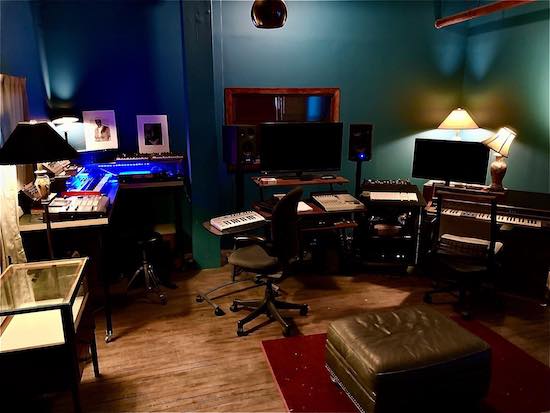
I had begrudgingly resigned myself to working within the confines of a record studio in my own home. I got used to the frequency “quirks” that came with mixing in a small bedroom. I could robotically run mic cable lines through the maze of our house in my sleep.
I was alerted to a Milwaukee audio engineer who was selling a bunch of gear for cheap, so I went to his studio to check out the haul. It turned out he was downsizing as he had decided to move out of his studio space rental. I called the landlord. The price was low AND it was already outfitted to have a functional control room and separate live room with double sided windows. Wild-eyed, I talked it over with my studio partner and my bandmates and decided that it was to become our new studio and band practice space. We work out of this space to this day.
Takeaways: This is certainly any studio’s highest cost and one to take on extremely carefully. You can make this more manageable by sharing space with another engineer or other bands. For our first year, we split the cost of rent between all our band members, with the band utilizing the live room as its rehearsal space. Now, we’re able to simply split the cost between the studio engineers (with one other engineer and his band paying into the space as well).
9. Create an LLC and document everything a year late
After moving into our studio space, I continued working with more clients and added further expenses (turns out you need the internet to run a recording studio). Pretty soon I realized that while I wasn’t raking in the dough, I already was already making what the IRS would view as taxable income. I set up a meeting with my accountant. She immediately helped me register an LLC. When tax season came around, she helped me begin the lengthy process of documenting everything I had failed to document the moment I started the studio. It took a few full days of work, but eventually I had a legally running business. Now I have a running excel spreadsheet where I document every expense and dime earned as they occur. It’s saving my ass come next tax season AND it’s a convenient way to monitor my costs and where I’m putting the money I’ve earned.
Takeaways: Stop what you’re doing right now. Document every single expense you’ve ever had for recording gear. Every single recurring fee. Document every single penny you’ve ever made. Call your accountant. Set up an LLC. Get the ball rolling before you’ve got a mess of backtracking to do. This is the least fun part of it all, but it’s nice to avoid being audited.
10.Never feel good enough; always evolve
The world of audio engineering is ever evolving and already incredibly saturated. It takes constant self-evaluation and calculation. Where are your skills? What’s your niche? In a world where anyone can make a decent sounding recording on their MacBook, why should anyone hire you to do anything?
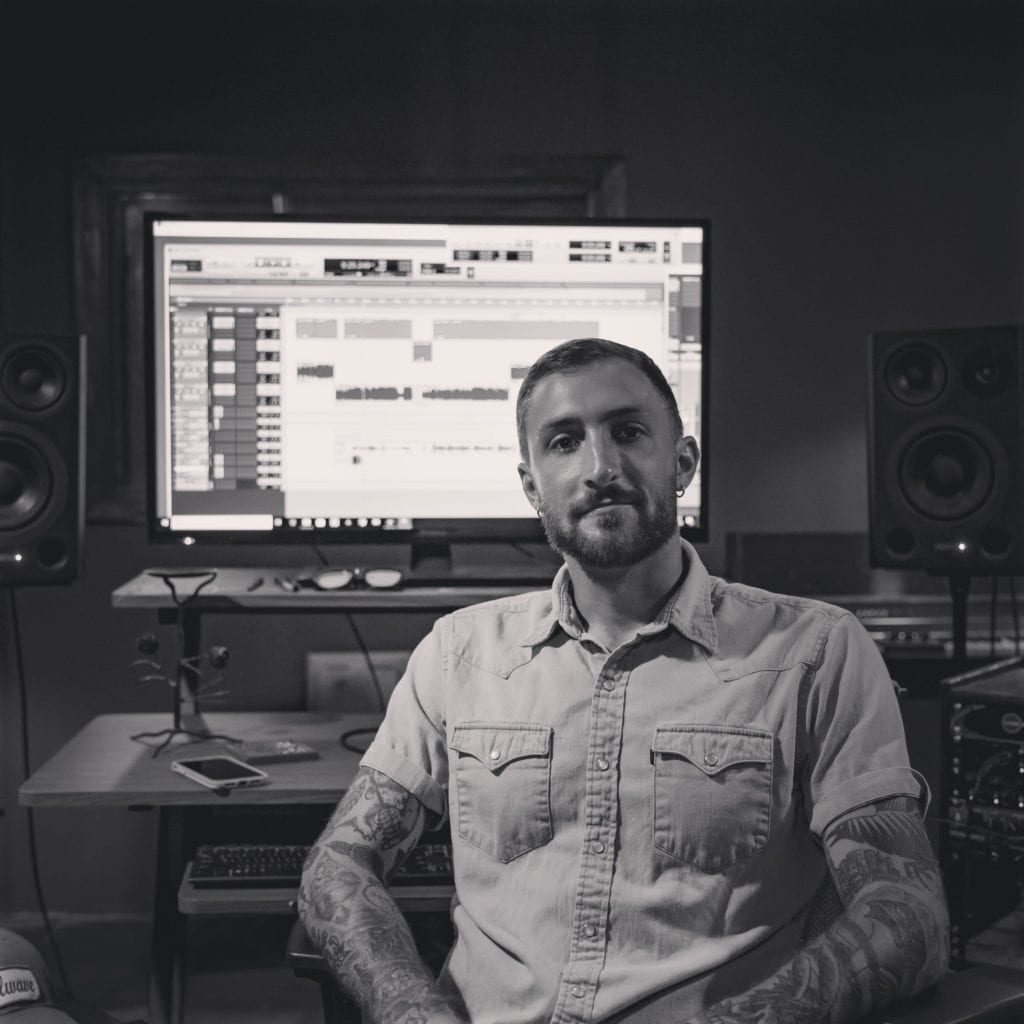
In my perfect world, I’d spend all my days working with artists through the whole process: tracking, mixing and mastering every project. However, I’ve recognized the bulk of my current studio income comes from mixing jobs and individualized tracking jobs. Often the work can simply be “mic and track drums for a band in the live room, send them the raw files, wave goodbye”. All I can do is improve in other areas to incentivize new clients to hire me for full projects while enjoying the niche work I’m receiving.
My studio partner Erik often tells me I’m too negative when I talk about my studio work and that I tend to sell it short. He might be right. I love what I do and believe in the quality of my work. But the attitude of “I’m not good enough” has been the fire continually lit under my ass to work harder and make improvements.
Never for one second become satisfied that you’re the Steve Albini of (insert your city). Believe in your work, have fun, keep growing, and make a ton of stupid decisions. Put yourself in debt. Take some classes. Work anywhere you can find it. Eventually you’ll find yourself running your own studio, even if it’s gonna take the occasional bartending gig.
Alex Meylink is an audio engineer in Milwaukee who works out of Stillwave Studios. He also plays in Telethon, Intolerable Swill and Brave You
Leave a Reply